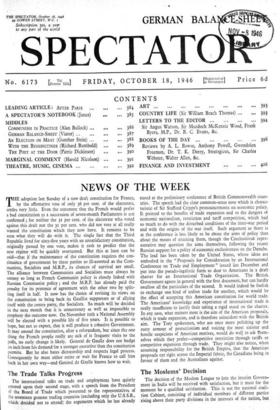The Trade Talks Progress
The international talks on trade and employment have quietly entered upon their second stage, with a speech from the President of the Board of Trade which presented to the representatives of the seventeen greatest trading countries (excluding only the U.S.S.R., Which decided not to attend) the arguments which he has already
stated at the preliminary conference of British Commonwealth coun- tries. The speech had the clear common-sense note which is charac- teristic of Sir Stafford Cripps's pronouncements on economic policy. It pointed to the benefits of trade expansion and to the dangers of economic nationalism, restriction and tariff competition, which had so much to do with the disturbed conditions of the inter-war period and with the origins of the war itself. Such argument as there is at the conference is less likely to be about the aims of policy than about the means of attaining them, though the Czechoslovak repre- sentative may question the aims themselves, following the recent Russian support for a policy of economic exclusiveness on the Danube. The lead has been taken by the United States, whose ideas are embodied in the " Proposals for Consideration by an International Conference on Trade and Employment " issued last December and put into the pseudo-legalistic form so dear to Americans in a draft charter for an International Trade Organisation. The British Government agrees in general with the first document, but can hardly swallow all the particulars of the second. It would indeed be foolish to exchange one kind of unfree trade for another, which would be the effect of accepting this American constitution for world trade. The Americans' knowledge and experience of international trade is really insufficient to justify their taking a rigid stand on the charter. In any case, what matters most is the aim of the American proposals, which is trade expansion, and is therefore coincident with the British aim. The Tory spokesmen, who are once more polishing up the rusty armour of protectionism and voicing the most sinister and hostile suspicions of American motives, would do well to ask Them- selves which they prefer—competitive restriction through tariffs or competitive expansion through trade. They might also notice, when assuming responsibility for the British Empire, that the American proposals cut right across the Imperial fabric, the Canadians being in favour of them and the Australians against.






























